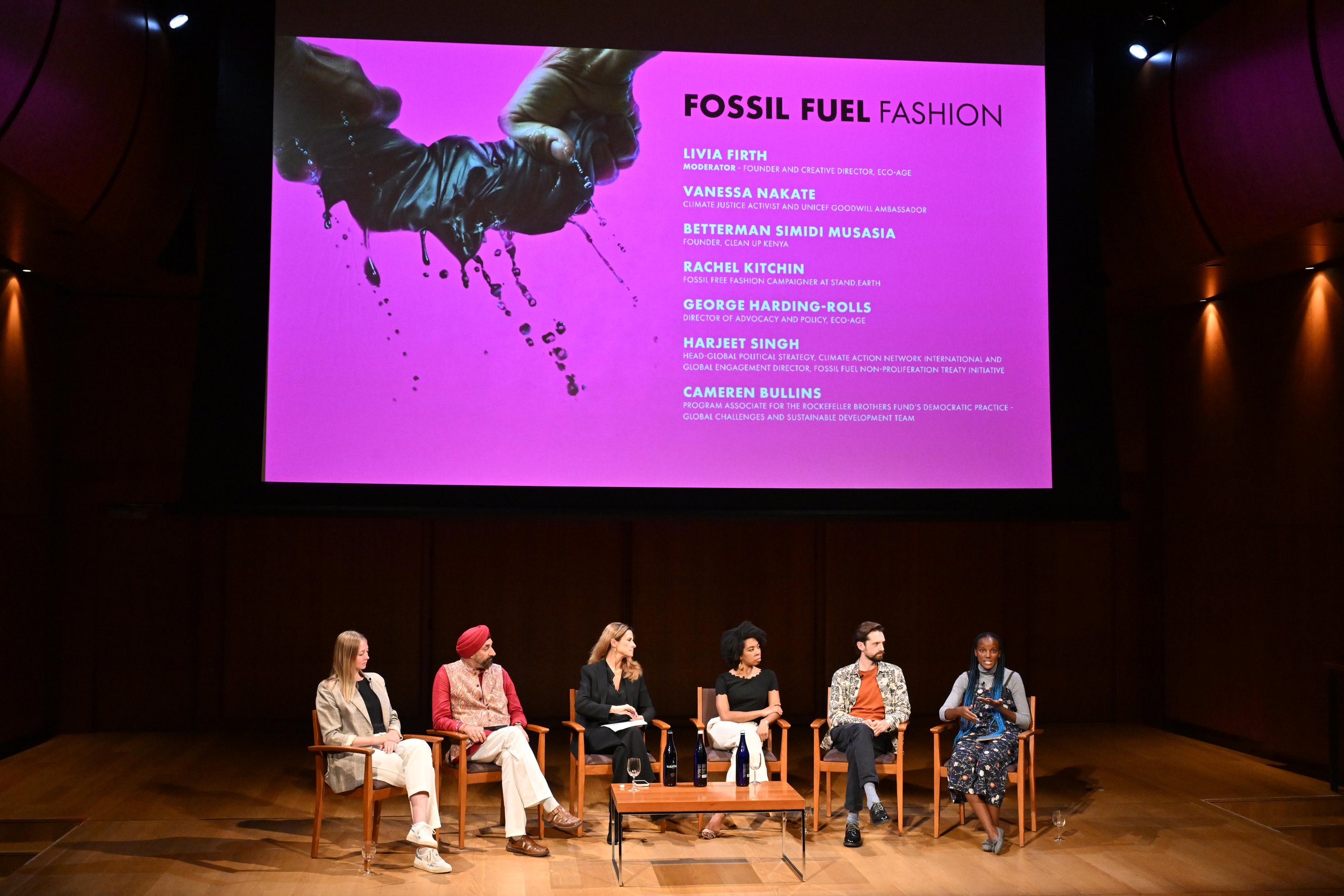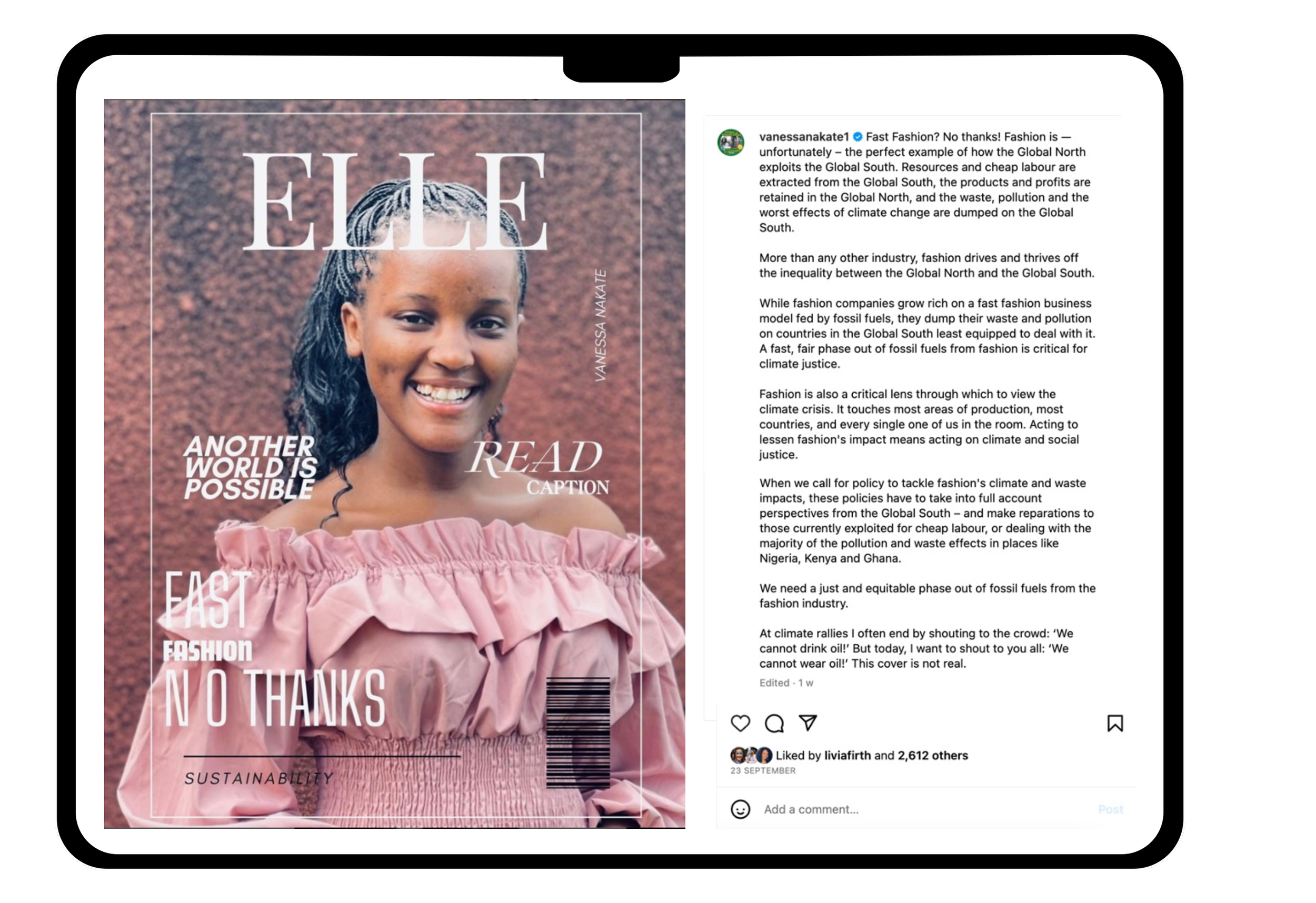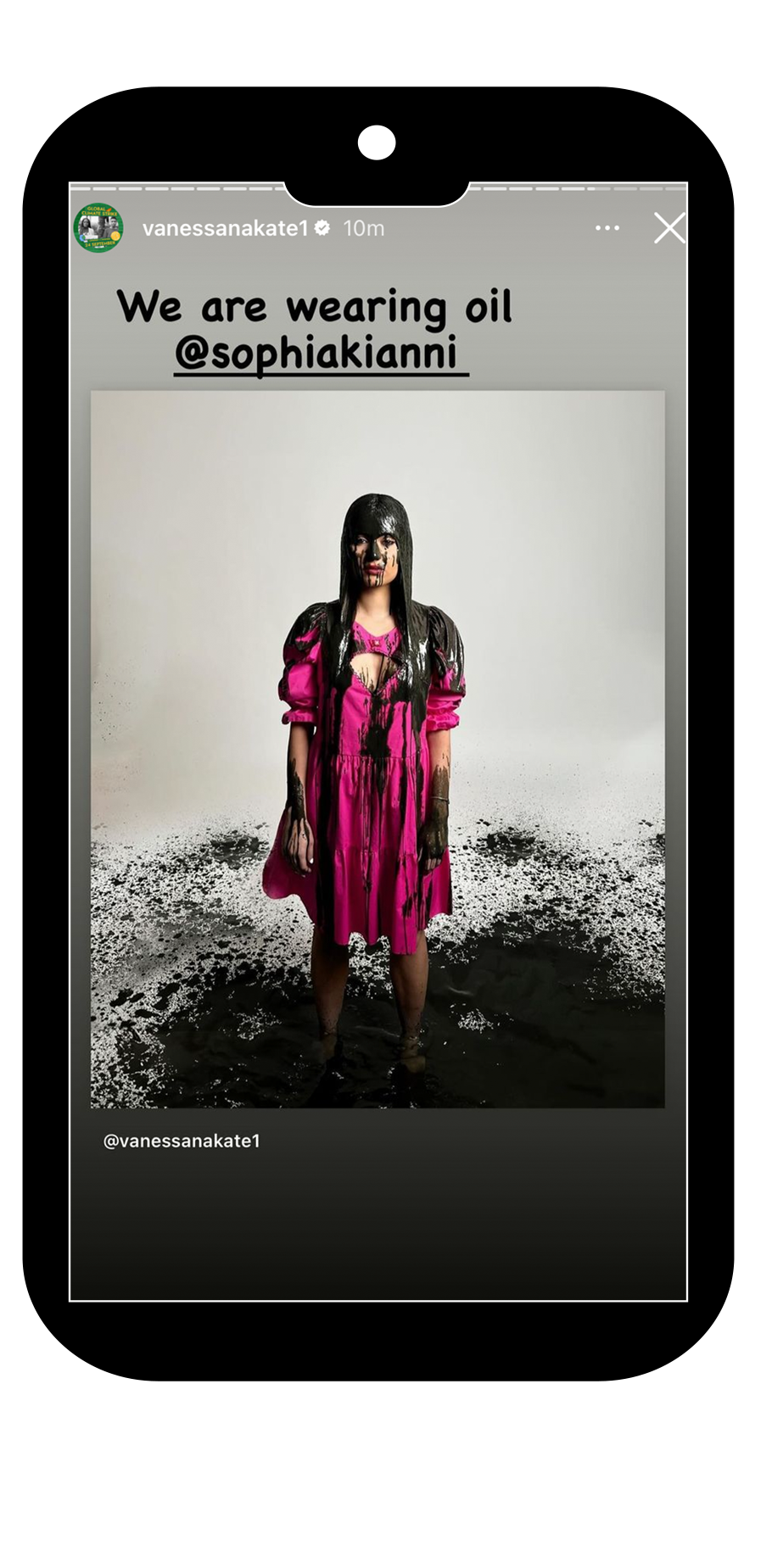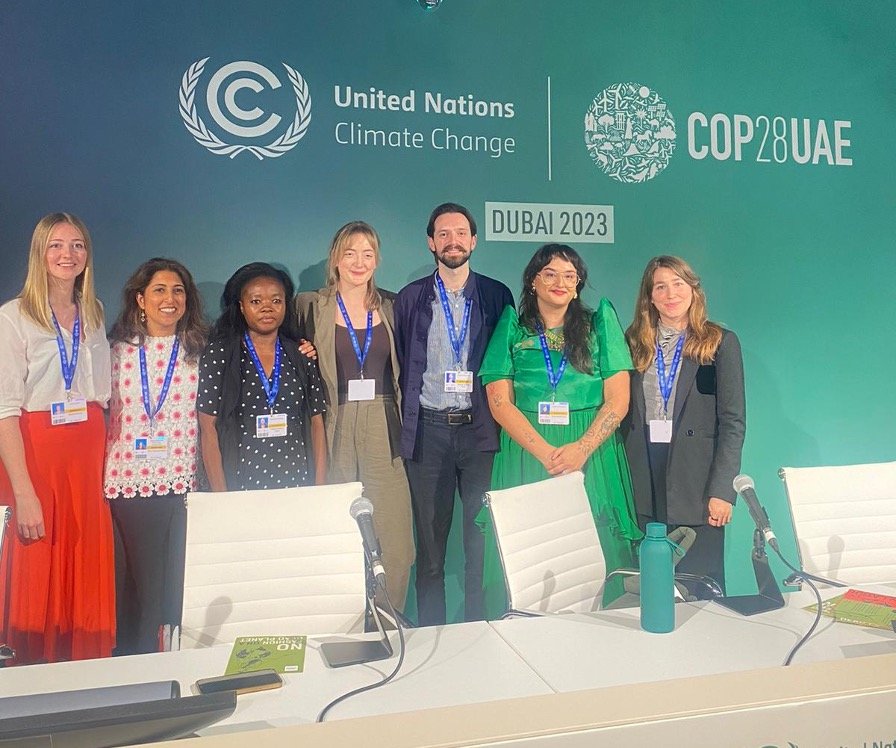
CAMPAIGN REPORT
SEPTEMBER - DECEMBER 2023
CAMPAIGN TOTAL MEDIA REACH: 121M+ | CAMPAIGN TOTAL SOCIAL REACH: 25M+

A FAIR PHASE OUT OF FOSSIL FUELS FROM FASHION
FAST FASHION RUNS ON
FOSSIL FUELS.
The fashion industry is projected to emit 1.27 metric gigatons of CO2e in 2030. To limit additional warming to 1.5 degrees Celsius, the sector needs to cut its emissions by 45 percent from 0.89 metric gigatons in 2019 to 0.49 metric gigatons by 2030. For this, we must undergo a 5 year sprint to drastically cut the industry’s reliance on fossil fuels.
But in a time of Climate crisis, fashion is deepening its reliance on fossil fuels for materials and power, producing more waste than ever, and still heavily dependent on exploitation of workers.
The FOSSIL FUEL FASHION campaign was set up as a rallying cry to unite calls for a fair phase out of fossil fuels in the fashion industry under one campaign and coalition of partners.
The fashion industry is responsible for up to 8% of global emissions, that’s more than shipping and aviation combined. The aim of our campaign is to significantly reduce that proportion of emissions by pushing for fair phase out of fossil fuels from fashion.
OUR PARTNERS
From NGOs and academics, to solution providers and fashion opinion leaders, we have convened a group of partners whose reach and influence in the fashion space is unprecedented.
SEPTEMBER 19, 2023. FOSSIL FUEL FASHION CAMPAIGN AT
NEW YORK CLIMATE WEEK
TOTAL MEDIA REACH: 42M+ | TOTAL SOCIAL REACH: 4M+
The FOSSIL FUEL FASHION campaign launched on Tuesday 19th September during Climate Week NYC, with an expert-led panel discussion on fashion’s over-reliance on fossil fuels.
The panel speakers were Ugandan climate justice activist and Nobel Peace Prize nominee, Vanessa Nakate, Eco-Age Founder, Livia Firth MBE, Eco-Age Policy Director George Harding-Rolls, Global Engagement Director to the Fossil Fuel Non-Proliferation Treaty Initiative, Harjeet Singh, Founder of Clean Up Kenya, Betterman Simidi Musasia, Stand.earth’s Corporate Climate Campaigner, Rachel Kitchin and Program Associate for Democratic Practice-Global Challenges and Sustainable Development at The Rockefeller Brothers Fund, Cameren Bullins.
The event, hosted by The Rockefeller Brothers Fund at New York City's iconic Morgan Library, saw the panel engage in an important discussion in front of a full audience comprising of business leaders, civil society, philanthropists, UN delegates, climate activists and key fashion industry figures such as:
•Stephen Dunbar-Johnson, President, International of The New York Times
•Aditi Mayer, Climate Campaigner
•Dominique Palmer, Climate Justice Activist
•Sarah Kent, Chief Sustainability Correspondent at The Business of Fashion
•Wes Sechrest, Ph.D., CEO and Board Chair, RE:WILD
•Carmen Gama, Director of Circularity at Eileen Fisher
•Maxine Bedat, Founder of New Standard Institute
•Phil Bloomer, Director of Business and Human Rights Resource Centre
•Paloma Escudero, Senior Adviser for Climate Advocacy for UNICEF
•Harry Mills, Researcher at Centre for Natural Material Innovation (CNMI), University of Cambridge
•Dana Davis, VP of Sustainability, Product and Business Strategy at Mara Hoffman
Built on more than three years of investigations and research by the campaign’s partners, including Stand.earth, Plastic Soup Foundation, and the Geneva Centre for Business and Human Rights, the FOSSIL FUEL FASHION campaign highlights the intrinsic link between Big Oil and the fashion industry, and the direct correlation between the growth of fast fashion and its reliance on synthetic fossil fuel derived fibres – one cannot exist without the other.
MEDIA COVERAGE
PR HIGHLIGHTS
VOGUE BUSINESS
BUSINESS OF FASHION
WWD
SOURCING JOURNAL
BUSINESS OF FASHION
SOCIAL MEDIA COVERAGE
HIGHLIGHTS
OCTOBER 12, 2023. FOSSIL FUEL FASHION CAMPAIGN AT
EUROPEAN PARLIAMENT
VANESSA NAKATE’S SPEECH AT THE EUROPEAN PARLIAMENT
Ugandan climate activist and FOSSIL FUEL FASHION Campaign partner Vanessa Nakate addressed climate commissioner Wopke Hoekstra during an online debate at the EU Parliament about the vital need to call for a fair phase out of fossil fuels at COP28.
“I am here to ask the EU to call for a just and equitable phase out of all fossil fuels at COP28. And each business sector must play its role in the fossil fuel phase out – including the fashion industry which is using more and more oil and gas to create huge volumes of fast fashion, which is then dumped and burned in communities in Africa.”
VANESSA NAKATE
THE EU’S ROLE IN A FAIR PHASE OUT OF FOSSIL FUELS FROM FASHION
ROUNDTABLE DISCUSSION
The FOSSIL FUEL FASHION Campaign convened MEPs, NGOs, academics, and industry opinion leaders in a roundtable hosted by Saskia Bricmont MEP at the European Parliament. Speakers included Brussels Secretary of State, Barbara Trachte, Rapporteur for Ecodesign (ESPR), Alessandra Moretti MEP, Ghana representative and The Revival founder Yayra Agbofah, and Kenya representative and Clean Up Kenya Founder Betterman Simidi.
The discussion, under Chatham House rule, focused on the EU’s leading role in legislating the fashion industry toward a fair phase out of fossil fuels. Participants also discussed how the Global South currently bears the weight of exploitative fashion practices and the implications of this for a just transition to net zero. Social justice ultimately must be a core factor determining a pathway to fossil-fuel-free fashion.
The pervasive theme was one of social justice and a fair transition, and how in combination with cheap synthetic materials this creates the formula for fast fashion and exploitation.
Key insights included:
•Fashion should be used as a lens to inspire action – climate is viewed as a negative threat, whereas fashion is uplifting and should be used for positive progress
•Fossil fuel production impacts developing countries and textile production hubs multiple times: we extract raw materials, including fossil fuels; we burn them, creating emissions and pollution; products and profits are hoarded by the Global North; pollution and waste are dumped back on vulnerable communities, which are often some of the least prepared for the climate crisis. Policy is failing to recognise this dynamic.
•Working in extreme conditions, such as heat-stress, workers are already robbed of wages (wage theft remains endemic in fashion production) and have little financial resilience. Fashion is a people-centered industry and around 80% of workers are women. The current system represents abuse after abuse heaped on those who shoulder most of the burden – and none of the reward – of a highly profitable industry.
•A major obstacle to fair decarbonisation is social inequality given fashion is a people-centred industry involving 70 million workers, 80% of whom are women.
•We must ensure social justice is at the core of a just transition, where the workers’ voices are listened to and represented.
•The impact on workers has not been properly analysed and there is a clear and present danger that the industry will take the wrong course of action, focusing on self-interest for the few.
•There is a lack of joined up thinking from a policy perspective, and many are working at cross purposes. We need to unifying call of a fair phase out of fossil fuels in order to focus efforts in the right places.
•Production is demand driven and targets need to be put on production volumes. Products don’t fail materially, but because people loose interest in them. None of the current legislation / regulation addresses plastification and overproduction. How long things are used is not about durability but about consumption
•Alessandra Moretti specifically highlighted the fallacy of recycling plastic bottles into clothing – as the ecodesign rapporteur, this is a significant announcement and alignment with campaigners’ asks.
NOVEMBER 27 2023. FOSSIL FUEL FASHION CAMPAIGN AT
FASHIONSCAPES OF TRANSFOMATION PANEL
TOTAL MEDIA REACH: 8,008,457
EU PANEL HIGHLIGHTS FASHION'S PLASTIC PROBLEM AND SOCIAL ISSUES
The FOSSIL FUEL FASHION Campaign collaborated with Alessandra Moretti MEP to host the Fashionscapes of Transformation panel discussion at the European Parliament, following on from our roundtable discussion in October.
The panel gathered activists and lawmakers to underscore the need for stronger regulations within the European Union to address the fashion industry's fossil fuel addiction and social justice issues.
The conversation featured EU Commissioner Virginjus Sinkevicius, Laurence Tubiana CEO of European Climate Foundation and architect of the Paris Agreement, Paola Migliorini MEP, Simon Giuliani of Candiani, Natalie Swan of Business and Human Rights Resource Centre, Matteo Ward a sustainable fashion expert, and Yayra Agbofah founder of Ghana’s The Revival.
KEY TAKEAWAYS AND RECCOMENDATIONS
Currently, there are over 16 bills under consideration, covering aspects such as design, waste management, corporate reporting, and microplastics. These bills aim to transform the fashion industry by 2030.
Key elements of the EU's Textiles Strategy, including the Eco-design for Sustainable Products Regulation, are already in progress, with others being pushed to be over the line by the end of the current Commission’s mandate. There are key opportunities to push back on fossil fuel reliance in these policy processes.
Commissioner Virginijus Sinkevičius called for fast fashion to become “past fashion.” Alessandra Moretti MEP again highlighted the use of plastic bottles for clothing as a false solution.
Yayra Agbofah highlighted the need for urgency in policy interventions, Black Friday and Halloween outfits are already flooding Ghanian markets.
Social issues were front and centre of discussions, emphasising that workers in the supply chain are already experiencing the burden of climate change, and in many cases there is a trade-off between greening supply chains and fair pay and conditions.
Overproduction and overconsumption remain significant core issues, driving rapid environmental degradation, the export of huge volumes of waste to the Global South, and evermore consumption of fossil fuels for synthetic fibres.
The EU's goal to phase out fossil fuels aligns with the fashion industry's need to reduce reliance on oil-based materials, it is imperative that we continue to apply pressure to the fashion industry to cut fossil fuel reliance in materials and manufacturing
MEDIA COVERAGE
PR HIGHLIGHTS
WWD
VOGUE ITALIA
MILANO FINANZA
FASHION UNITED
INSIDE DENIM
SPORTS TEXTILES
APPAREL RESOURCES
YAHOO NEWS
THE SPIN OFF
DECEMBER 5, 2023. FOSSIL FUEL FASHION CAMPAIGN X SOPHIA KIANNI
WE ARE WEARING OIL
TOTAL MEDIA REACH: 82M+ | TOTAL SOCIAL REACH: 21M+
WE ARE WEARING OIL WITH SOPHIA KIANNI
On Energy Day at COP28, Iranian-American climate activist Sophia Kianni launched her We Wear Oil social media campaign in partnership with Vogue Arabia and the Fossil Fuel Fashion Campaign.
Sophia worked with creatives Bright Colors and Public Opinion (who worked pro-bono) covering herself in “oil” to draw attention to the intrinsic link between fossil fuels and the fashion industry. Sophia highlights that ‘synthetics’ is just another term for fossil fuels. Cheap, fossil fuel-based fibers – like polyester – allow fashion to overproduce and lead to a direct correlation between the growth of synthetic fibers and the fast fashion industry.
The fast fashion industry has become part of the fossil fuel industry. The more clothing we buy, the more coal, oil and gas we consume.
The We Wear Oil campaign called for global leaders to bring the fashion industry to the forefront of fossil-fuel phase out discussions and keep the industry accountable for the promises made in the Paris Agreement. The campaign also highlighted our power to make a difference as consumers by rewearing outfits, buying mindfully, choosing second hand over new, and raising our voices for change.
Ultimately, the most sustainable garment is one you already own.

SOCIAL MEDIA REACH: 21M+
MEDIA COVERAGE
PR HIGHLIGHTS
WWD
MARIE CLARIE
VOGUE US
BOF
PR WEEK
VOGUE ARABIA
VOGUE ARABIA
LE DEVOIR
L’INDIPENDENTE
DECEMBER 2023. FOSSIL FUEL FASHION CAMPAIGN AT
COP 28
EXPLORING A JUST TRANSITION IN FASHION
As part of Fashion Revolution’s delegation, Eco-Age was invited to attend COP28 in Dubai to attend several events with campaign partners and to moderate a panel featuring Fashion Revolution, Stand.earth, Action Speaks Louder, Solidaridad, The Institute for Sustainable Communities, Diamond Denim and The Transformers Foundation. The group issued a list of demands for fashion brands and governments ahead of the event. Insights from the panel included:
80% of brands do not disclose volume of production, 94% do not disclose fuel sources used in manufacturing.
The Just Transition is a key opportunity for a course correction of some baked-in inequalities in the fashion system
We need to triple renewable energy by 2030, brands need to be enabling and purchasing additional energy to send a signal to the markets
We need to look at the contextual opportunity space, balancing feasibility and impact. i.e just because the majority of emissions are at the mill level, doesn’t mean that’s where it’s most feasible.
Need to look beyond just capex to opex – how can these decarbonisation efforts be sustained and not at the cost of living wage/safety.
Needs a blended finance or concessionary finance approach because the private sector will not do it alone – we must address what is the financial architecture of the transition.
We must be mindful also of false solutions in decarbonisations such as regrettable substitution with biomass, or intensity based targets
MEDIA COVERAGE
PR HIGHLIGHTS
VOGUE BUSINESS
MARIE CLARIE
VOGUE US
VOGUE BUSINESS
VOGUE UK

COMING UP
19 SEPTEMBER 2023
Fossil Fuel Fashion Campaign launches in New York
12 OCTOBER 2023
European Paliament Roundtable Discussion:
The EU’s Role in a Fair Phase out of Fossil Fuels From Fashion
27 NOVEMBER 2023
Fashionscapes of Transformation with Alessandra Moretti MEP
Brussels
On November 27th, we will be supporting Ecodesign Rapporteur Alessandra Moretti MEP in hosting Fashionscapes of Transformation on the EU’s role in driving pioneering legislation for a more sustainable fashion industry.
The shift towards more sustainable products is a key element of the EU’s crackdown on fast fashion. In the context of emissions pathways to keep global heating below 1.5°C and ahead of COP28, this event seeks to explore the role of policy measures such as eco-design in reducing the fashion sector’s reliance on fossil fuels, ending social exploitation, and creating a flourishing fashion industry which operates within planetary boundaries.
The event will be a panel discussion at European Parliament moderated by Livia Firth, MBE with Keynote speech by Commissioner Virginijus Sinkevicius and closing remarks from Laurence Tubiana, CEO European Climate Foundation.
1 DECEMBER 2023
We Wear Oil
COP28
Featuring Sophia Kianni in Vogue Arabia, this campaign will highlight the intrinsic link between fossil fuels and fashion as COP28 kicks off in Dubai.
The social media campaign – supported by world-renown climate activists such as Tori Tsui and Dominique Palmer – will call for consumers to #rewear a garment for at least #30wears.
Global consumption of clothing is increasing, and yet we use each garment much less before throwing it out. Encouraging consumers to re-wear garments will help combat overconsumption driving fast fashion.
9 DECEMBER 2023
Fashion Revolution Panel
COP28
George Harding Rolls, Policy Director and Eco-Age and Fossil Fuel Fashion Campaign Lead, will moderate Fashion Revolution’s panel exploring the intersecting issues of fashion waste and decarbonization. This is the only fashion related side event at COP28, highlighting the exclusion of fashion from climate and fossil fuel phase-out conversations.
2024
Using Eco-Age’s communication specialty and track record in production to present a new vision of a fashion industry. Activities to include Fashionscapes: Oil on the runway (documentary), activist stunts and activations, high level engagement with fashion opinion leaders, journalists and policymakers in the EU, UK and US.
2024-2026
Roadmap for a post fossil fuel fashion sector, co-created with our NGO partners to get businesses on track to kick out fossil fuels. We will be working with investors to get the right incentives in place to create change, stewarding progressive businesses and supporting solutions to scale. We will also be driving the next stage of research and investigations to keep pressure applied to the industry, and deepen awareness and understanding of the issue.


























